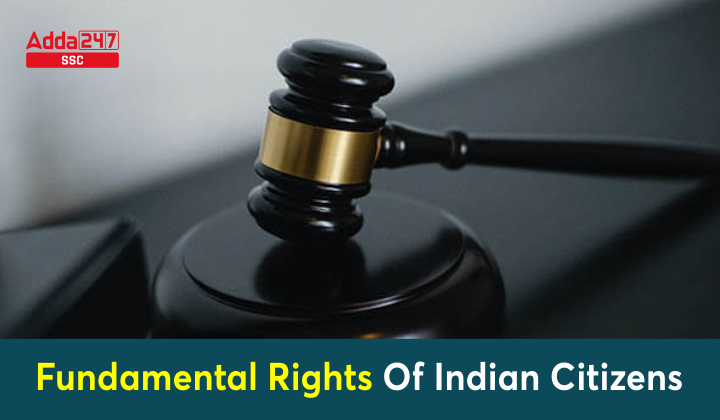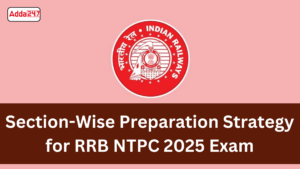Table of Contents
Fundamental Rights of the Indian Constitution: Fundamental rights are essential rights given to every citizen, which are important for their personal growth and development. The Indian Constitution, which has the distinction of being the longest constitution in the world, contains the fundamental rights of Indian citizens from Articles 12 to 35 in Part 3. Many scholars have called this part of the constitution as the Magna Carta of India. 6 fundamental rights were adopted from the United States Constitution.
What are the 6 Fundamental Rights of the Indian Constitution?
Article 12-35 of the Indian Constitution deals with the Fundamental Rights. These rights are for the Indian Citizen and these rights are inviolable. Articles 12 to 35 in Part III of the Indian Constitution provide for six Fundamental Rights. These rights are mentioned below:
- Right to Equality (Articles 14–18)
- Right to Freedom (Articles 19–22)
- Right against Exploitation (Articles 23–24)
- Right to Freedom of Religion (Articles 25–28)
- Cultural and Educational Rights (Articles 29–30)
- Right to Constitutional Remedies (Article 32)
Fundamental Rights Origin
We can trace the first demands for the inclusion of Fundamental Rights in governance to 1895 and subsequent attempts by the Indian National Congress in 1917 and 1919. When the founding fathers of our constitution set out to take on the humongous task of writing the Indian Constitution after independence in 1947, the inclusion of Fundamental Rights was one of the primary agendas. Originally, there were seven fundamental rights in the Indian Constitution.
However, the Right to Property was abolished in 1978 by the 44th Constitutional Amendment. The remaining six fundamental rights are still in force and are essential for the development of an individual and the nation as a whole. It is important for every citizen to be aware of their fundamental rights and to exercise them whenever necessary.
Fundamental Rights in the Indian Constitution
According to the Indian Constitution, there are six basic Indian Fundamental Rights of Indian Citizens, which are the right to equality, the right to freedom of religion, cultural and educational rights, the right to freedom, the right to constitutional remedies, and the right against exploitation. The Individual Fundamental Rights and duties of Indian Citizens include the following:
- Equality before the law
- Freedom of religion
- Freedom of association and peaceful assembly
- Freedom of speech and expression
- Right to constitutional remedies for the protection of civil rights
Fundamental Rights of Indian Citizens
Here is the complete list of the Indian Fundamental Rights of the Indian Constitution for every citizen of India with articles. Candidates can check the detailed fundamental rights list of all the article that comes under the Fundamental Rights of the Indian Constitution.
| Six Fundamental Rights of the Indian Constitution | ||
|---|---|---|
| S. No | Fundamental Right | Article of Constitution |
| 1 | Right To Equality (Articles- 14 to 18) |
Art. 14- Equality Before Law |
| Art. 15- Prohibition of discrimination on grounds of religion, race, caste, sex, or place of birth | ||
| Art. 16- Equality of opportunity in public employment | ||
| Art. 17- Abolition of untouchability | ||
| Art. 18- Abolition of Titles | ||
| 2 | Right To Freedom (Articles- 19 to 22) |
Art 19- Freedom of speech, expression, movement |
| Art 20- Protection from a conviction for offenses | ||
| Art 21- Right to Life & Personal Liberty | ||
| Art 22- Protection against arrest or detention | ||
| 3 | Right Against Exploitation (Article- 23 & 24) |
Art 23- Protection from Trafficking & Forced Labour |
| Art 24- Ban on child labor | ||
| 4 | Right To Freedom of Religion (Articles- 25 to 28) |
Art 25- Freedom to practice one’s own religion |
| Art 26- Freedom to manage religious affairs | ||
| Art 27- No taxation for the promotion of religion | ||
| Art 28- Freedom as to attendance at religious instruction or religious worship in institutions | ||
| 5 | Cultural & Educational Rights (Articles 29 & 30) | Art 29- To Protect & Preserve the minorities |
| Art 30- Right of minorities to administer educational institutions | ||
| 6 | Right To Constitutional Remedies (Article 32) | Art 32- Remedies for enforcement of rights |
6 Fundamental Rights of the Indian Constitution
The Constitution offers all citizens, individually and collectively, some basic freedoms. These are guaranteed in the constitution in the form of six broad categories of Fundamental Rights, which are justifiable. Here we have provided detailed information about the Fundamental Rights in the Indian Constitution. We have mentioned everything about the Fundamental Rights in the Indian Constitution with all articles.
1. Right To Equality (Articles 14 to 18)
- Equality before the law and equal protection of laws (Article 14).
- Prohibition of discrimination on grounds of religion, race, caste, sex, or place of birth (Article 15).
- Equality of opportunity in matters of public employment (Article 16).
- Abolition of untouchability and prohibition of its practice (Article 17).
- Abolition of titles except military and academic (Article 18).
- The exception to the Right to equality allowed by the Indian Constitution is that the President or the Governor of a state is not answerable to any court.
2. Right To Freedom (Articles 19 to 22)
- Protection of six rights regarding freedom of (Article 19)
- Speech and expression
- To Assemble peacefully and without arms
- Form associations or unions
- Move freely throughout the territory of India
- Reside of settling in any part of the country
- Practice any profession or carry any trade or business
- Protection in respect of conviction for offenses (Article 20)
- Protection of life and personal liberty (Article 21): No person shall be deprived of his life or personal liberty
- Right to elementary education (Article 21A): It makes the right of education for children of the age of 6 to 14 years a fundamental right.
- Protection against arrest and detention in certain cases (Article 22): No person who is arrested shall be detained in custody without being informed of the grounds for such arrest.
3. Right Against Exploitation (Articles 23 & 24)
- Prohibition of traffic in human beings and forced labor. (Article 23)
Traffic in human beings and beggars and other similar forms of forced labor are prohibited. - Prohibition of employment of children in factories, etc. (Article 24)
No child below the age of 14 years can be employed to work in any factory or mine or engaged in any other hazardous employment.
4. Right To Freedom of Religion (Articles 25 to 28)
- Freedom of conscience and free profession, practice, and propagation of religion (Article 25)
- Freedom to manage religious affairs (Article 26)
- Freedom from payment of taxes for the promotion of any religion (Article 27)- The state can not compel any citizen to pay any taxes for the promotion or maintenance of any particular religion or religious institution.
- Freedom from attending religious instruction or worship in certain educational institutions (Article 28)
5. Cultural & Educational Rights (Article 29 & 30)
- Protection of language, script, and culture of minorities (Article 29)
Where a religious community is in the minority, the constitution enables it to preserve its culture and religious interests. - Right of minorities to establish and administer educational institutions (Article 30)- Such communities have the right to establish educational institutions of their choice and the state shall not discriminate against such an educational institution maintained by a minority community.
6. Right To Constitutional Remedies (Article 32)
The right to constitutional remedies is termed the “Soul of the Constitution” by Dr. BR Ambedkar. Right to Constitution Remedies empowers Indian citizens to approach a court of law, in case of any denial of their fundamental rights. This Right gives also empowers Courts to preserve or safeguard the citizens’ fundamental rights as laid out in the Constitution.
The Writs (Article 32 & Article 226)
For the enforcement of fundamental rights, the judiciary has been armed with the power to issue the writs. The Supreme Court can issue an order or following writs for the enforcement of the fundamental rights against any person or Government within the territory of India:
(i) Habeas Corpus: Habeas Corpus is a legal term that means “you may have the body”. It is a writ or legal order that requires a person who is detained or imprisoned to be brought before a court or a judge. The purpose of the writ is to ensure that the person is not being held illegally or without sufficient cause. It is issued to the official or a private person who has detained another person in his custody. The latter is produced before the court to let the court know on what grounds he has been confined.
(ii) Mandamus: Mandamus is a legal term that refers to a writ or order issued by a court that commands a public official or a lower court to perform a specific duty or to act in a particular way. The purpose of a writ of mandamus is to ensure that public officials and lower courts perform their duties following the law and in the public interest. It means Command. It commands the person to perform some public or legal duty that the person has refused to perform.
(iii) Prohibition: A writ of prohibition is a legal order issued by a court that prohibits a lower court or a public authority from acting outside its jurisdiction or more than its lawful authority. The purpose of a writ of prohibition is to prevent a court or an authority from exceeding its jurisdiction or acting arbitrarily or illegally. This writ is issued by a higher court to the lower court to not exceed its jurisdiction limit. It is issued during the pendency of the proceedings.
(iv) Certiorari: Certiorari is a legal term that refers to a writ or order issued by a court that seeks to review the decision of a lower court or a public authority. The purpose of a writ of certiorari is to ensure that lower courts and public authorities act following the law and that their decisions are not arbitrary or illegal. This writ is also issued against courts or tribunals to quash the order or decision of the court or tribunal. It can be issued only after the order has been made.
Fundamental Duties (Article 51A)
The Constitution of India in addition to various rights also gives some responsibilities to the citizens of the country to maintain the prosperity of our great nation. These are mentioned in Part IVA and Article 51A of the Indian Constitution. The 10 original Fundamental Duties were added to the constitution via the 42nd Constitutional Amendment 1976 as recommended by the Swaran Singh Committee. The 11th Fundamental Duty was added via the 82nd Constitutional Amendment 2002. These fundamental duties were largely inspired by the institutions of the former Soviet Union. Total 11 essential duties in India. We should follow the Indian Constitution. Following is the list of 11 fundamental duties:
- Adhere to the Constitution and respect the National Flag and National Anthem
- Follow the ideals of the freedom struggle
- Protect the sovereignty & integrity of India
- Protect the country and render national services when called upon
- To develop a feeling of common brotherhood
- Preserve the composite culture of the country
- Preserve natural environment
- Develop scientific temper and humanity
- Safeguard public property and avoid violence
- Strive for excellence in all spheres of life.
- All parents/guardians have to send their children in the age group of 6-14 years to school.
| Check Related posts: | |
| State and Capitals in India | 8 Union Territories in India |
| Dams In India | Largest State of India |




 Free Study Material for SSC CGL 2025, Do...
Free Study Material for SSC CGL 2025, Do...
 Free Study Material for CBSE Junior Assi...
Free Study Material for CBSE Junior Assi...
 Section-Wise Preparation Strategy for RR...
Section-Wise Preparation Strategy for RR...


